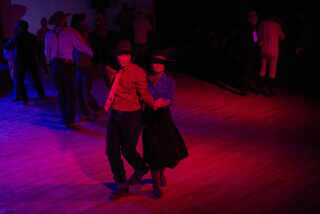Reaching In and Out
- Share via
Toronto’s veteran rock band the Cowboy Junkies is slowly emerging from its cool, shy shell to display some relative playfulness. Throughout the group’s splendid concert Friday night at the Cerritos Center for the Performing Arts, a maturing Margo Timmins not only sang with more feeling and confidence, but also interacted with the audience, at times sharing stories and getting downright chatty.
The Junkies’ desire for a more direct link to their fans has manifested itself in several ways, including the creation of their long-awaited Web site (https://www.cowboyjunkies.com) and mailing list; resurrection of their own label (Latent Recordings) to release the new “Rarities, B-Sides and Slow, Sad Waltzes”; and in Timmins’ case, sticking around after shows to visit with concert-goers.
And for the last few tours, the Junkies have enlisted singer and acoustic guitarist Karin Bergquist and organ-piano player Linford Detweiler, both members of the Ohio-based Over the Rhine. They add vocal harmonies and instrumental muscle to the Junkies’ overall sound, and in turn get mainstream exposure not usually available to an indie-rock band.
The Cowboy Junkies’ subdued, folk-based textures formed the musical core of Friday’s nearly two-hour performance. The group flexed its muscles just enough to avoid settling into a mellow, one-dimensional affair.
On the quieter side, a sparse version of “Misguided Angel” soared as Timmins’ emotive vocal was intertwined with Jeff Bird’s delicate touches on the mandolin. Also striking was “Those Final Feet,” a duet featuring Margo and Michael Timmins on guitar that was dedicated to the siblings’ late grandfather.
The whisper-voiced Margo crooned a haunting lyric: “You said never to grow old/But you forgot to tell me how/You said never to grow old/Then sank your teeth into those final feet.”
In a similar vein, several cuts from the new album were slow and sad, particularly the meandering “River Waltz” and a heart-wrenching tale of love and death, “Five Room Love Story.”
The quartet did vary the pace from time to time, lightening the mood (somewhat) with “Sun Comes Up, It’s Tuesday Morning,” which Margo Timmins prefaced by saying, “I keep introducing this as the happiest song we do. It’s about breaking up with someone, but there’s a wonderful feeling when you know you’ve done the right thing.”
A few straight-ahead, mid-tempo rockers, such as “Miles From Our Home,” were energizing but otherwise uneventful. But the quartet caught fire with a pair of mesmerizing encores.
Echoing the eerie introduction to the Doors’ “The End,” the unsettling “Blue Guitar” offered the distortion-heavy electric guitars of Michael Timmins and Bird, each plunging into a variety of tones and colors that included wah-wah, psychedelic and blues. Probing and experimental, it was a spirited jam.
Then a rockabilly-tinged, harmonica-driven rave-up titled “If You Gotta Go, Go Now” ended the concert with a kick as the Junkies acted--albeit briefly--like a freewheelin’, sweat-inducing bar band. Who would have thought it?
As the opening act, finger-picking guitarist Leo Kottke, who has influenced a generation of musicians, played a mix of old and new selections. The Minnesota-based folkie’s astonishing slide and 12-string guitar skills were in fine form, whether reinventing a Woody Guthrie nugget or his own “Morning Is the Long Way Home,” which has resurfaced in an instrumental form on his new release, “One Guitar, No Vocals.”
Kottke sang a bit Friday night. While he is not a gifted vocalist, Kottke wasn’t too shabby during a pair of old favorites, “Rings” and “Louise.” In fact, the Georgia native infused the latter tune--a melancholy tale of love and death pulled from his 1973 LP, “My Feet Are Smiling”--with a noteworthy depth of feeling.
No Kottke performance would be complete, however, without at least one incoherent monologue. One 10-minute stretch roamed in topic from an ill-fated canoe trip on the Crow River to an excruciating interview on National Public Radio to “hating Spike Jones as an 8-year-old, violin-playing snob in Cheyenne.”
Such stream-of-consciousness rambling could derail the average entertainer. Somehow, it added a quirky character to Kottke’s undeniable charms.
More to Read
The biggest entertainment stories
Get our big stories about Hollywood, film, television, music, arts, culture and more right in your inbox as soon as they publish.
You may occasionally receive promotional content from the Los Angeles Times.









